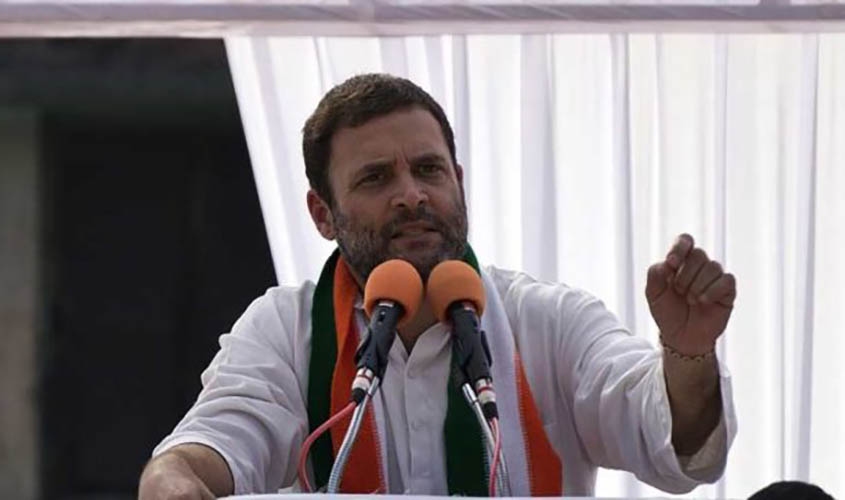There is little doubt that over the past one year Rahul Gandhi has evolved as a politician and the transformation is evident from the manner in which he has been addressing vital matters that crop up from time to time. However, he still has a long way to go, and thus is vulnerable to traps set up through questions and statements aimed at inducing him to stir a controversy of sorts. Most of the time he seems to forget that the Congress, with its back to the wall, is facing a rejuvenated Bharatiya Janata Party led by two full time politicians, Narendra Modi and Amit Shah, who have perfected the art of realpolitik.
The duo has the capacity to create chances for their party where none exist, and have always taken head-on a street combat, regardless of the outcome. In other words, Modi and Shah are political gladiators, who would employ every conceivable method to checkmate their opponents whether inside or outside the Sangh. Drawing a leaf from the manner in which world heavyweight boxing bouts are listed, providing the defending champion the prerogative of picking his opponents in a title defence fight, apparently Modi and Shah are applying the same principle to the political confrontations in the country as well.
On many occasions both also play rounds two and three, while concurrently playing round one, thereby anticipating and pre-empting threats from their potential rivals at any given time. For instance, not only these two, but the entire political class, including the Congress, realises that if the 2019 election was to be showcased as a contest between Modi and Rahul, the incumbent Prime Minister would have a decisive advantage.
Therefore, when Rahul, while answering a query during an interaction in Karnataka, expressed his inclination to become the Prime Minister, in the event of the Congress or its allies winning the 2019 Lok Sabha polls, he must not have figured how the innocuous remark would become the talking point of a serious political discourse on virtually every TV channel. Bringing in the hypothetical element of the question he had clearly stated, “that it depends on how the Congress performs…if it emerges as the biggest party—yes”. When further probed that what would happen in case it was an alliance, he replied, “…if the Congress is the biggest party, then yes”. The candid answer was enough to incur a calibrated and well thought through response from the BJP’s spin doctors, who lost little time in mocking the Congress president for making himself a PM nominee, and projecting next year’s epic showdown as a Modi versus Rahul one.
In the process, the BJP attempted to alter the Karnataka Assembly election narrative from Siddaramaiah versus Modi that was not working to its benefit to Rahul versus Modi. Whether their efforts succeeded or not would be known only on counting day, since the general consensus is that a Rahul-Modi fight would end with the PM winning hands down.
Coming as it did a year before the Parliamentary polls, the BJP’s think tanks would now ensure that this narration remains unchanged. Modi and Shah would also be at ease that their work would be less burdensome if the billing was conducted on these lines. It goes without saying that the Modi versus Rahul fight has its own abundant share of political advantages.
Alternatively, a Modi versus Mamata Banerjee contest for the top slot would be a far more difficult proposition. Modi would have to deploy all his political astuteness to get the better of the West Bengal Chief Minister, who like the Prime Minister, is essentially a street fighter, and knows the turf like the back of her hand. She is the undisputed leader of her state, and thereby the prospects of her being in line as the first potential Bengali PM nominee would make her the recipient of unprecedented support. Significantly, her opponents, despite their best efforts, have been unable to nail her down to anything substantially damaging.
Mamata is a Brahmin, who has the capacity of garnering a pan India support-base if in the event caste politics comes into play during the 2019 finals. She has acquired her political acumen from the Congress, and therefore could readily secure the support of Congress activists, past and present, in view of ideological similarities. Being a woman, in large sections she would touch a chord, thus coming out as the most formidable challenger to the Prime Minister. Some of her methods bear an uncanny resemblance to the tactics used by the BJP’s top leadership. Finally, she has wide acceptability amongst regional leaders, who are exploring the possibility of forging a federal front against the BJP and the Congress.
In fact, the BJP would prefer to pit itself against an alliance led by Rahul Gandhi, rather than the one spearheaded by Mamata Banerjee. This is where Rahul has to understand the intricacies of politics. At present he has to choose between his own ambition whose actualisation appears difficult and the larger opposition objective of weakening the BJP. Given this scenario, his role should be that of a facilitator rather than that of a main combatant. Within his own party, there are leaders with better credentials, yet on account of inner party politics have had to take a back seat.
Modi and Shah possess the knack and strategy to stall Rahul and secure the ground. Between us.

